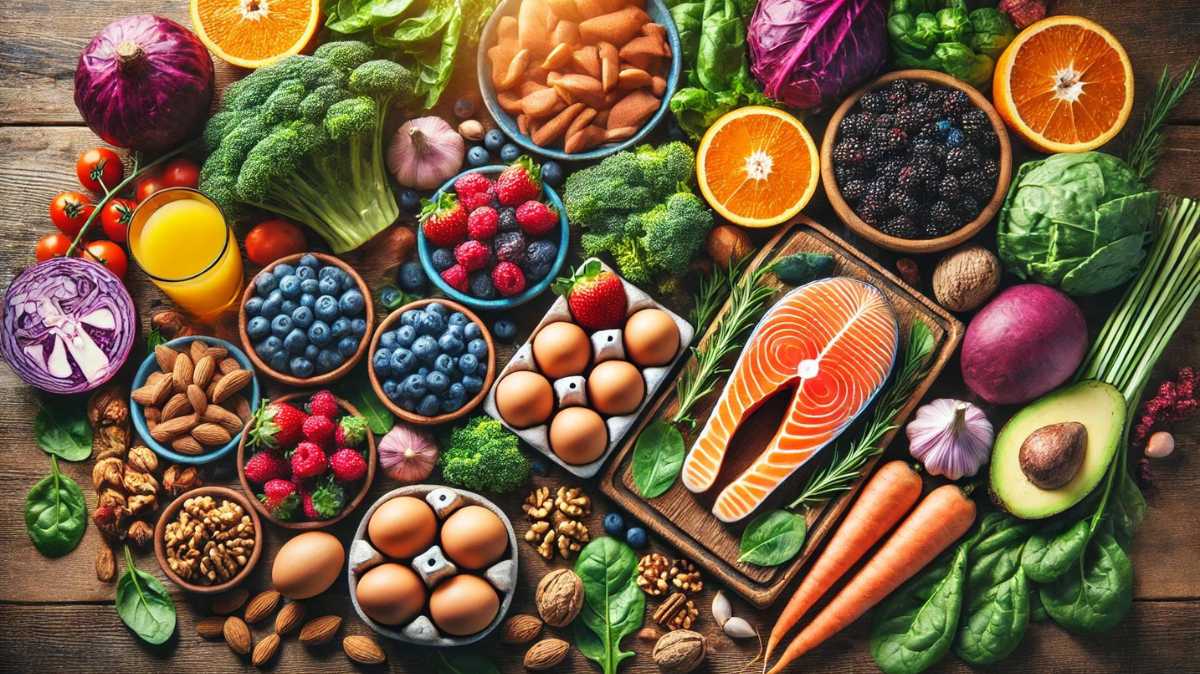When it comes to nutrition, you don’t just want to eat — you want to fuel your body with premium, high-octane nutrients. So, what are the best foods that contain the nutrients your body craves? This is the million-dollar question, and the answer lies in nutrient-dense foods. These superstars provide a treasure trove of essential vitamins, minerals, and more, all without saddling you with empty calories.
In this article, we’ll go beyond the basics, diving deep into the best foods packed with nutrients. Whether you’re a doctor, nutritionist, or health-conscious individual, it’s time to level up your dietary knowledge. Buckle up, because this is not your average food list — it’s a tour through the nutritional elite.
The Science Behind Nutrient Density: Why You Should Care
Let’s start with the basics: nutrient-dense foods. These are foods that deliver high amounts of essential nutrients for relatively few calories. They’re like the VIP lounge at a fancy event — not everyone makes the cut, but those who do bring the best of the best.
These foods are rich in vitamins, minerals, antioxidants, and fiber while being low in unhealthy fats, sugars, and empty calories. The result? They power your brain, bones, muscles, and everything in between.
1. Fatty Fish (Salmon, Sardines, Mackerel)
When it comes to brain-boosting, heart-healing nutrients, fatty fish like salmon are the all-stars. Why? Omega-3 fatty acids. These healthy fats are like rocket fuel for your brain, improving cognitive function while reducing inflammation and protecting your heart. Omega-3s are so crucial that they are essential for every cell in your body.
A 100-gram serving of wild-caught salmon provides:
- 2.2g of omega-3 fatty acids
- Protein: 25g
- Vitamins B12, D, and selenium
Tip: Always choose sustainably sourced fish to keep both your body and the planet healthy.
2. Leafy Greens (Kale, Spinach, Swiss Chard)
Kale may be the diva of the health food world, but for good reason. Leafy greens like kale, spinach, and Swiss chard are loaded with essential vitamins A, C, and K, along with a robust lineup of antioxidants, magnesium, and calcium.
Kale’s nutrient stats per cup:
- Calories: 9 (that’s right, just nine!)
- Vitamin C: 134% of the Daily Value (DV)
- Vitamin K: 684% of the DV
Pro tip: Toss these greens into your smoothies, soups, or salads. You won’t even notice you’re eating the equivalent of a nutritional gold mine.
3. Berries (Blueberries, Strawberries, Blackberries)
Here’s a fun fact: berries, particularly blueberries, are brain food in a bowl. Packed with antioxidants, especially anthocyanins, these tiny fruits help fight inflammation and may protect your brain from cognitive decline. Plus, they’re delicious, so it’s a win-win.
Nutrient punch in 1 cup of blueberries:
- Calories: 85
- Vitamin C: 24% of the DV
- Fiber: 4g
Not only do they burst with flavor, but they also improve your heart health by reducing oxidative stress and keeping your arteries clear.
4. Garlic: The Tasty Immunity Booster
This pungent little bulb is a disease-fighting powerhouse. Garlic contains sulfur compounds like allicin, which has been linked to lower blood pressure and improved cholesterol levels. Research shows it can also lower your risk of heart disease and bolster your immune system.
Perks of one clove of garlic:
- Vitamin C, B6
- Calcium, potassium
- Disease-fighting antioxidants
Adding garlic to your diet doesn’t just keep the vampires away — it keeps illness at bay too!
5. Eggs: Nature’s Perfect Multivitamin
If you’re looking for a food that’s versatile, delicious, and nutrient-packed, look no further than the humble egg. Often referred to as “nature’s multivitamin,” eggs are high in choline, lutein, and zeaxanthin — all critical for brain function and eye health.
In a large egg:
- Protein: 6g
- Vitamin B12, D
- Choline: 25% of the DV
While eggs have had a bad rap in the past due to cholesterol concerns, current research shows that, for most people, they’re perfectly safe and incredibly nutritious.
6. Nuts & Seeds (Walnuts, Almonds, Flaxseeds)
Tiny but mighty, nuts and seeds are a rich source of healthy fats, fiber, and protein. Walnuts top the list due to their impressive omega-3 content, while flaxseeds and chia seeds are fantastic for digestive health and heart support.
1 ounce of walnuts contains:
- Omega-3 fats: 2.5g
- Magnesium: 11% of the DV
- Fiber: 2g
Snack on them, add them to your salads, or mix them into smoothies for an easy nutrient boost.
7. Shellfish: The Nutritional Powerhouse of the Sea
For a potent dose of vitamins and minerals, shellfish like clams, oysters, and mussels are hard to beat. Oysters, in particular, are an incredible source of zinc, a mineral that’s essential for immune function and wound healing.
In just six oysters:
- Zinc: 291% of the DV
- Vitamin B12: 133% of the DV
Feeling tired? Low in iron? Clams have your back with loads of B12 and iron.
8. Liver: The Original Superfood
You may not think of liver as a daily menu item, but it’s one of the most nutrient-dense foods you can eat. Liver is packed with iron, B vitamins, copper, and vitamin A. It’s especially good for those who are anemic or need to boost their vitamin B12 intake.
Per 100 grams of beef liver:
- Vitamin A: 1,000% of the DV
- Vitamin B12: 3,467% of the DV
- Iron: 35% of the DV
Pro tip: If the taste isn’t your favorite, try liver pâté or sneaking it into ground meat dishes.
9. Sweet Potatoes: A Carotenoid Champion
Sweet potatoes are your go-to food for beta-carotene, an antioxidant your body converts to vitamin A, which is essential for eye health, immune support, and skin integrity.
In one medium sweet potato:
- Vitamin A: 438% of the DV
- Fiber: 4g
- Vitamin C: 37% of the DV
Besides being delicious, sweet potatoes are extremely filling, making them a great addition to any meal plan.
10. Dark Chocolate: The Guilt-Free Indulgence
Let’s sweeten the deal with dark chocolate. Yes, you read that right. Dark chocolate (70% cacao or higher) is not just a treat — it’s rich in antioxidants like flavonoids, which improve heart health and reduce inflammation.
Per ounce of dark chocolate (70-85% cocoa):
- Fiber: 3.1g
- Iron: 19% of the DV
- Magnesium: 16% of the DV
Just be sure to enjoy in moderation. While it’s nutrient-rich, it’s still calorie-dense, and too much of a good thing… well, you know how that goes.
Conclusion: Building the Ultimate Nutrient-Dense Plate
So, what’s the secret to ensuring you get all these nutrients? Variety. By filling your plate with a range of whole foods—from fatty fish and leafy greens to eggs and berries—you give your body the tools it needs to function at its best. Remember, the best foods that contain nutrients aren’t just about ticking off vitamins and minerals; they’re about enjoying foods that support your health, taste delicious, and leave you feeling energized.
Incorporate these nutrient-dense powerhouses into your meals, and watch your health transform. Whether you’re aiming to improve cognitive function, protect your heart, or simply feel better, these foods will help you achieve your goals — no magic supplements required!
FAQs
1. What are the most nutrient-dense foods?
Nutrient-dense foods include salmon, leafy greens like kale, berries, eggs, nuts, and seeds. These foods provide essential vitamins, minerals, and healthy fats while being low in calories.
2. Why are nutrient-dense foods important?
They offer high nutritional value, helping to boost overall health, improve brain function, and support heart health without excess calories.
3. How do I incorporate more nutrient-dense foods into my diet?
Start by adding leafy greens to salads, using fatty fish like salmon in meals, and snacking on nuts and berries.
4. Can eating nutrient-dense foods help with weight loss?
Yes, these foods are often low in calories but high in satiety, meaning they keep you fuller for longer, aiding in weight management.
5. What vitamins and minerals are found in nutrient-dense foods?
Key nutrients include omega-3s, vitamins A, C, and K, along with minerals like magnesium, zinc, and iron.
Author

An aspiring business leader, I am working towards my dream of graduating from Stanford University with a degree in Business Management. Passionate about sharing knowledge, I strive to empower others through education and collaborative learning.
View all posts


